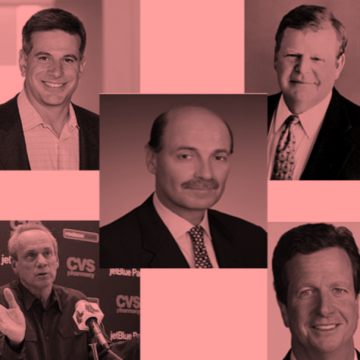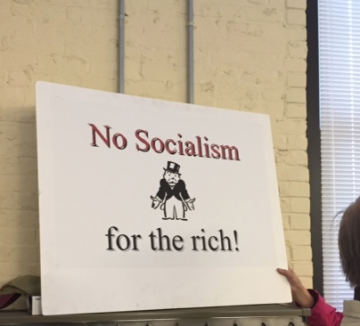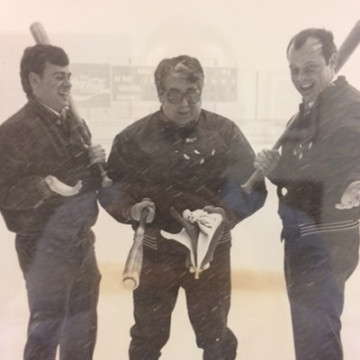How Some of the Richest Men in America Got Millions, Divided a State, & Ruined a Beloved Brand
Saturday, June 23, 2018
It all started in 2015 when one of the most influential corporate lawyers in Rhode Island put together a group of New England business titans to buy a minor league baseball team from the widow of one of the 'old school' league owners.
The late Jim Skeffington was a dealmaker. During his career, he crafted big deals and created exotic financing structures that made him and his law firm, the white-shoe firm of Edwards & Angell (E&A) millions in fees.
THIS IS THE FIRST IN A MULTI-PART SERIES LOOKING AT THE THREE YEAR BATTLE OVER THE PAWSOX STADIUM FINANCING
GET THE LATEST BREAKING NEWS HERE -- SIGN UP FOR GOLOCAL FREE DAILY EBLASTBy 2015, his legal career was winding down. His influential friends like former CEO of Fleet Bank Terry Murray and former Governor Joe Garrahy were bouncing grandchildren on their knees and, in the case of Murray, playing golf at Augusta National.
Moreover, the old E&A had merged and changed named multiple times — the firm shrunk in Providence from more than two hundred lawyers to just a couple of dozens. Now, Skeffington's power firm had been merged and consolidated so many times, it was just an office in a large national legal juggernaut.
Skeffington was convinced he could get the proverbial “band back together.” Maybe not the exact same band, but a band of some of the richest men in America — titans who combined could throw $20 million or so to Ben Mondor’s widow and take the team and move it from the old dying old mill town of Pawtucket to Providence.
For Skeffington, the deal was simple. Who wouldn’t want a glimmering new baseball stadium in downtown Providence right on the river and next to the next tech hot spot — the 195 land.
“We propose to build a new, multi-purpose, state-of-the-art ballpark on an eight-acre parcel of largely vacant land in downtown Providence. Our proposed site is located on the banks of the Providence River, visible from both Interstate 195 and 95 highways that lead into our capital city,” said Skeffington in an interview with GoLocal in 2015.
“My partners and I have invested both our time and capital in this project because we think it will be a game changer for the state and city. I am very proud of all of the projects on which I have worked and I believe this one will be a great success. Professional sports franchises have a unique capacity to serve as a platform to help charitable causes in their home community. Our goal is to have our team be that platform,” he added.
It was going to be Skeffington at his best. A big deal, lots of state incentives, tax breaks, and tax stabilizations. It was the old formula applied to a minor league baseball team and the investors would make millions -- the team would just have to finance the stadium, but they could collateralize all the subsidies.
The Best Rolodex in America
The PawSox ownership includes was a who's who of the guys who built the biggest corporations ever in Rhode Island and New England. Between the bunch of them, they had the best Rolodex in America. They built CVS, Fleet, Nautic, and TJX. It was the dream team and each posted a reported $2 or $3 million to own a slice of the team. It was 'chump change' for this group.
- Bernard Cammarata, the founder and 40-year veteran of TJX. According to a 2013 Boston Business Journal story, just Cammarata’s holding in TJX stock exceeded $137 million.
- William P. Egan, Alta Communications/Marion Equity Partners. Alta was once one of the hottest media venture capital groups; Egan owns (through a family trust) a summer house on Ocean Avenue in Newport that is assessed at over $4 million.
- Habib Gorgi manages Nautic Partners, the firm that now has a reported $3.3 billion under management. He is the only full-time Rhode Island resident.
- J. Terrence Murray built Fleet Bank into one of America’s and sold it to Bank of America. He grew up in Woonsocket, but today is reported to be one of two from Rhode Island who belong to America’s most exclusive club - Augusta Country Club.
- Thomas Ryan, forget the $30 million in stock and salary he posted some years at CVS. Just Ryan’s exit package in 2011 was $185 million according to Forbes - one of the top 10 exit packages paid in business in the past decade in the U.S.
- Paul Salem joined the ownership group in 2017 — he is co-founder and Senior Managing Director of Providence Equity Partners. Salem is second in the food chain to his co-founder and CEO Jonathan Nelson. According to Forbes, Nelson is the richest man in Rhode Island. As of June 2017, Forbes ranks Nelson’s wealth at just under $2 billion. The firm has $50 billion under management.
- Larry Lucchino, former President of the Boston Red Sox. Played a top-level role with the Washington Redskins, Baltimore Orioles, and San Diego Padres. His specialty is big sports deals and shepherding the development of new stadiums. Had big wins in both Baltimore and San Diego.
Others with ownership include Fenway Partners of the Boston Red Sox ownership and billionaire Red Sox owner John Henry.
Who could deny them?
At the time of the PawSox purchase from the Mondor family, only two of the PawSox owners were Rhode Island residents (Skeffington and Gorgi). Others who made their fortune in Rhode Island had changed their residency to Florida for the sun and maybe the tax situation.
Deal Criticized
But once the deal was unveiled, the public support for the stadium seemed to deflate. Skeffington and fellow owners were asking for a mega-deal — an ask of subsidies of $120 million plus a tax stabilization worth as much as an additional $30 million in tax savings.
Critics said it was another 38 Studios style deal. Economists in Rhode Island -- and outside -- raised questions. Holy Cross Economics Professor Victor Matheson told GoLocal back in 2016 that team owners tend to look for state funding because there isn't a good return on investment when they build the stadiums themselves. The spike in attendance and revenue doesn't justify the expenditure, he said. On average, when a team builds a new stadium, its revenues increase by roughly $2.7 million per year. But the team's owners are looking for roughly $4 million per year from the state to cover the expenses of building the stadium.
As the criticism to the deal began to build, the team’s frustration began to build.
The PawSox began to threaten to move the team to Fall River, New Bedford, Worcester or Springfield. In one radio interview, a team spokesperson said no matter what the team was moving out of Pawtucket.
Public opinion began to build against the PawSox. This was no longer lovable Mondor's team. This was bigtime.
Skeffington began to pivot. "We rolled out a program that obviously isn't working," said Skeffington of the owners' pitch to have the state subsidize an $85 million stadium with $120 million over 30 years, that Raimondo had called "not fair" following a presentation by owners and consultants to the Commerce Corporation on Monday, April 28, 2015.
As the PawSox season started in April, Skeffington tried to 'work the crowd' at McCoy Stadium. Dressed in $1,000 plus suit and silk ties the contrast was apparent from the PawSox late owner Mondor.
Mondor was famous for greeting fans at the front gate in an old PawSox jacket. At the time of Mondor’s death in 2010, PawSox president Mike Tamburro said, "Ben was a man who brought people together - whether it be at the business table or the ballpark. His love for the fans and the community was unsurpassed."
Skeffington had had decades of deal-making success, but hamming it up with Little Leaguers and their families from Burrillville was not in his repertoire.
Skeffington struggled to connect to fans despite crisscrossing the city of the state holding community meetings and offer incentives. At one community meeting in the Mount Hope section of Providence on May 15, Skeffington said, "We want a micro-brewery."
The crowd asked for more information about jobs, community involvement, and charitable involvement by the owners.
"I'm planning on building a charitable foundation to help kids," said Skeffington. "San Miguel [School} is one we like a lot."
In the midst of the battle to save the Providence stadium, Skeffington died at the age of 73.
The dream for the Providence stadium functionally died with Skeffington and then entered Larry Lucchino.
Part 2 will be published on Sunday
Related Articles
- EDITORIAL: Pawtucket Can’t Afford Pawtucket, Let Alone the PawSox Deal
- EDITORIAL: PawSox — Cooking the Numbers. Stadium Funding Cannot Work with False Numbers.
- EDITORIAL: Mr. Speaker, Do Not Succumb to a Last Minute, Backdoor PawSox Deal
- Pryor Talks Fane, Superman, PawSox and More on GoLocal LIVE
- New PawSox Deal - Owners Continue to Refuse to Take on Risk
- PawSox Attendance Inflated By As Much as 300%
- Guest MINDSETTER™ Bento: Keeping Watch on New PawSox Legislation
- Mattiello Cites GoLocal Poll in Rejecting Senate PawSox Measure
- Union Poll on PawSox Fails to Change the Game in RI
- Ruggerio on LIVE: I’m Open to Revised PawSox Legislation
- PawSox to Change Name to Osos Polares de Pawtucket During Tuesday Home Games
- “Hope is Not an Economic Strategy,” Says House Minority Leader Morgan on PawSox on LIVE
- Mattiello’s PawSox Plan May Increase Cost by $25 Million
- End of the Session PawSox Battle Continues in House Finance Hearing Tuesday Night
- RI House Approves Record $9.6B Budget, PawSox Bill Posted for Tuesday Hearing, Frias Awaits
- UPDATED: Grebien Blasts Mattiello and House Over PawSox Failure, Legislation Posted for Thursday
- EDITORIAL: RI Politics at its Worst — Last Minute Legislation Moving For PawSox Owners
- “This is What the Average Rhode Islander Doesn’t Like,” Says Giarrusso of PawSox Deal on LIVE
- EDITORIAL: Just “13% Strongly Support” Public Financing for PawSox Stadium
- $18M Developmental Disability Funding Restored, No PawSox in $9.5B House Budget Unveiled Friday
- Raimondo and Mattiello Differ on Whether New PawSox Legislation Puts RI Taxpayers on the Hook
- Whitcomb: Line by Line Veto; Into the Valley of PawSox Debt; Providence Phoenix Won’t Rise Again
- Bishop: PawSox or Not to Sox – That is The Question
- GoLocal Statewide Poll: Just 13% of Rhode Islanders ‘Strongly Support’ Funding the PawSox Stadium
- Dickinson Blasts Raimondo Over “Failure to Provide Leadership” on PawSox Legislation







